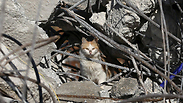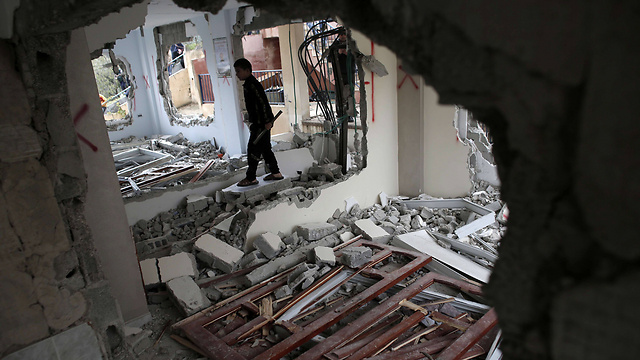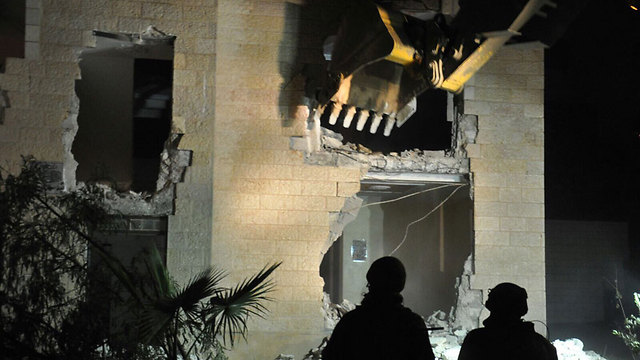
Despite promises, government delays demolition of terrorists' homes
About 230 Palestinians have attempted to kill Jews in the past six months, but so far only 10 homes have been demolished. One more has been sealed, and the demolition of the rest is being delayed by legal proceedings.
A Ynet investigation has revealed the number of terrorists' homes which have been demolished, and found out that despite there being 230 Palestinian terrorists who attempted to kill Jews in the recent terror wave's past six months, so far only ten homes have been demolished.
According to the IDF, since October only five terrorists' homes have been demolished, in addition to five floors of residential buildings that housed terrorists, with one terrorist’s home being sealed.
In addition, 124 homes have been mapped, and six demolition orders and seven initial notices have been issued, all initial bureaucratic steps that will only lead to concrete action in a while, if at all. The meaning of this is that Israel has no current plans of damaging about half of the homes occupied by terrorists from the current wave of violence, which many have been calling the third intifada.
Since October 1, 2015, the day Naama and Eitam Henkin were murdered, 230 terrorists went out to kill Israelis. In the absence of effective intelligence against individual terrorists, one of the main means of defense possessed by security authorities is deterrence. More and more investigations of attacks revealed that the fear of harming one's family or its financial state can prevent terrorists from heading out to perpetrate attacks. However, in practice almost no deterrent measures are being carried out.
Despite the cabinet’s decision to speed up the process of demolishing terrorist homes, most of the homes of those killed or who seriously injured their victims are still standing. In the a few cases where the security establishment also manages to demolish or seal a terrorist’s house, it happens weeks after the attack, a delay that is counterproductive.
The reason is that international law, which Israel is committed to preserving, has changed since the second Intifada. The security array has to legally prove that the demolition of a terrorist’s home is not a vindictive or punitive measure, but is designed to prevent the next attack. During the second intifada, the territorial brigade commander in the Judea and Samaria division was allowed to make his own decisions regarding the demolition of a terrorist’s home, and it would take place immediately within a few days or less.
Incidentally, two of the five houses that were completely demolished were of terrorists who murdered Jews in the middle of last year, before the outbreak of the current terror wave, and a third belonged to a terrorist who murdered the late Dalia Lemkus at the Alon Shvut intersection in November 2014.
In all five cases in which the demolition was partial, only including the terrorist home's floor, it was performed about two months after the date of the attack, long enough to allow the Palestinian Authority to provide the killer's family with a furnished and equipped alternative.
Among the six demolition orders that were issued for homes of terrorists, one is pending the approval of the Supreme Court: That of terrorist Aziz Meri from the village of Surda, who initiated and helped in the early October murder of Aharon Bennett and Nahmia Lavi near the Lions Gate in Jerusalem's Old City. Another decree, the demolition of the home of terrorist Abdallah Ischak from Silwad, who killed Malachi Rosenfeld in Binyamin, was struck down by the Supreme Court.
The initial seven warning notices issued for homes of terrorists involved in the murder of Jews in recent months are waiting to be processed by the Ministry of Justice. The decision and approval of house demolitions comes from the political leadership. In most cases, the IDF does not wait. Shortly after an attack, IDF engineers usually map out terrorists' homes, but afterwards it becomes unclear how much time will pass until the demolition actually occurs, if at all.
The issue of deportation
Another proposed deterrent, which has been delayed by the Ministry of Justice even though it has been principally approved by the Cabinet, is the expulsion of terrorists' families abroad, or to the Gaza Strip. A legislative amendment on the matter, which was presented to the Knesset last week by Minister Yisrael Katz, may lead to some change. However, the extreme step will probably be scrutinized by the High Court of Justice (HCJ).
While some of the terrorists who survived attacks strengthen the argument of the Israeli government in their interrogations, that the official Palestinian incitement on TV gives them an incentive to go out and kill Jews, even here there was a failure. The ministry of defense applied electronic countermeasures to disrupt Hamas’ TV broadcasts. The attempt was unsuccessful, so the main effort is invested in monitoring Facebook.
Some of the terrorists who survived their attacks have given more credence to the Israeli government's claims, according to which the incitement on official Palestinians television incentivized them to go out and kill Jews. Defense Ministry authorities have so far failed to properly disrupt the incitement on Hamas TV via electronic warfare, and so the bulk of their efforts is currently focused on monitoring social media.
As of this week, there is no intention to arrest Fatah officials in the West Bank who continue to publicly support terrorists, claiming repeatedly that soldiers or police officers have executed women and youths. Even a temporary shutdown of official Palestinian television, which is a major inciter, is not on the agenda. Hamas’ inciting broadcast stations in the West Bank have been frequently shut down by Israeli security forces in recent years, but the Israeli call for Palestinians to halt incitement on official TV channels appears to still be falling on deaf ears. Thus, the next lone-wolf terrorist gains his motivation.
After the attacks in the middle of last week, the political echelon decided on a further step against incitement that is akin to treating cancer with a band-aid: On the night between Thursday and Friday, the IDF and Shin Bet raided the Falasteen al-Yom television station, which broadcasts from Birzeit University near Ramallah. They confiscated equipment and detained the station manager for questioning. But the station, which is affiliated with the Islamic Jihad, continued to broadcast via an Egyptian company’s satellite.













